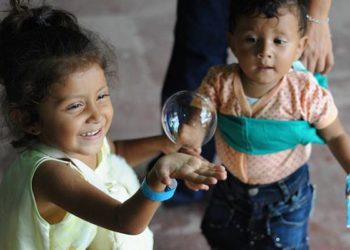Baby-led weaning not linked to increased choking
1. Reflective questionnaires and daily calendar data suggested that baby-led weaning (i.e., self-feeding of solid foods) was not linked to an increased choking risk compared to traditional spoon-feeding of soft foods.
2. By the age of 12 months, the majority of participating infants, regardless of study grouping, had been given foods considered to have a choking risk.
Evidence Rating Level: 1 (Excellent)
Study Rundown: Complementary feeding begins when breast milk no longer provides sufficient nutrition for the growing infant, typically by 6 months of age. Traditionally, this involves spoon-feeding soft foods. However, baby-led weaning (BLW), an approach in which babies are given ‘finger’ foods to feed themselves, is becoming more widespread. To assess the safety of this alternative method compared to traditional spoon-feeding, authors randomized pregnant women to control and Baby-Led Introduction to SolidS (BLISS) groups and asked families to complete questionnaires and calendars to track choking and gagging periodically over their baby’s first year of life. When applicable, additional information was collected about the most severe choking event. The BLISS group parents received additional education and support regarding safe feeding practices. Although the number of infants with reported choking events was comparable between groups, more BLISS group parents reported at least one gagging event between 6 and 7 months of age. An opposite trend was noted between 8 and 9 months of age: more control group parents reported at least one gagging event and, on average, a greater number of gagging events per infant. Regardless of number of choking and gagging events, researchers noted that the majority of babies had been fed foods classified as choking hazards. A limitation of this study was its possible lack of generality to unsupervised BLW. Nevertheless, the data highlight the importance of teaching parents safe feeding practices and suggest that both traditional spoon-feeding and BLW may be safe complementary feeding methods when implemented responsibly.
Click to read the study, published today in Pediatrics
Relevant Reading: Baby-Led Introduction to SolidS (BLISS) study: a randomised controlled trial of a baby-led approach to complementary feeding
Study Authors, Rachael W. Taylor, PhD and Anne-Louise M. Heath, PhD talk to 2 Minute Medicine: Department of Medicine and Human Nutrition, University of Otago, Dunedin, New Zealand.
“This paper is of interest to the medical profession because baby-led approaches to introducing solids are rapidly growing in popularity, but have a relatively limited evidence base. Our findings illustrate that many infants, regardless of how they are fed, are being offered foods that pose a choking risk, and that parents need education on how to safely introduce various solid foods, but also on the importance of always being with their child when they’re eating, and of knowing what to do if their child chokes.”
In-Depth [randomized controlled trial]: Participants in the BLISS study included 206 families from Dunedin, New Zealand. Pregnant women were randomized to a control or BLISS group for which additional instruction and support regarding feeding was provided. Although body mass index (BMI) at 12 months of age was the primary outcome for this study, choking, a secondary outcome, was assessed in multiple ways: by questionnaire when the child was 6, 7, 8, 9, and 12 months of age, by 4-week calendars at 6 and 8 months of age, and by weighed diet records. Gagging, in which the tongue reflexively moves to the front of the mouth, was also assessed and differentiated from choking, which was defined to be impaired breathing due to a food obstruction.
Both calendar and questionnaire results suggested that there was no difference in the number of infants that choked at least once between the control and BLISS groups. However, the mean number of gagging events per infant was significantly higher at 6 months and significantly lower at 8 months in the BLISS group compared to the control group (6 months: 14.7 events BLISS vs. 9.4 events control; 8 months: 5.6 events BLISS vs. 9.4 events control; p < 0.01 for both). Diet records revealed that at 7 months of age, 52% of the infants had been given a food considered to be a choking hazard, with no significant difference between groups. By 12 months, the percentage had climbed to 94%, again without a difference between groups. Although no increased choking risk was found, the majority of the most serious choking events reported each month occurred when the infant was feeding themselves (84%) and commonly involved food of “whole” consistency (58%).
Image: PD
©2016 2 Minute Medicine, Inc. All rights reserved. No works may be reproduced without expressed written consent from 2 Minute Medicine, Inc. Inquire about licensing here. No article should be construed as medical advice and is not intended as such by the authors or by 2 Minute Medicine, Inc.







